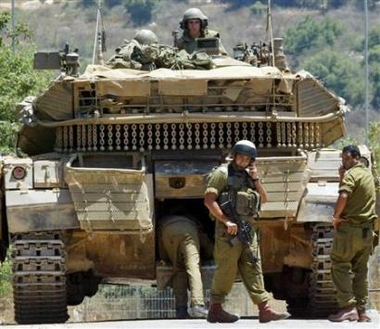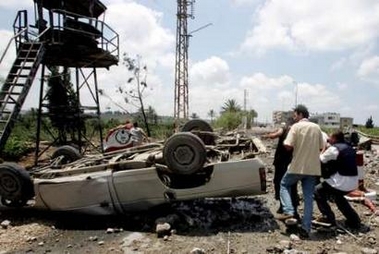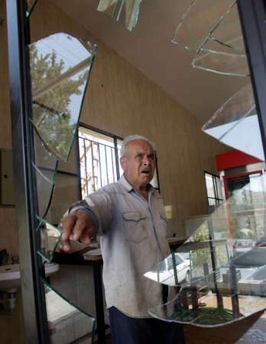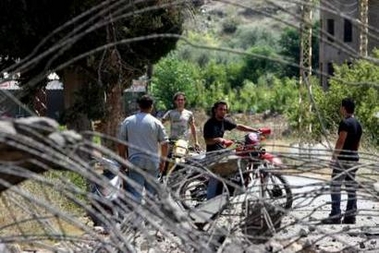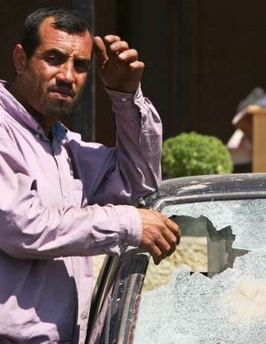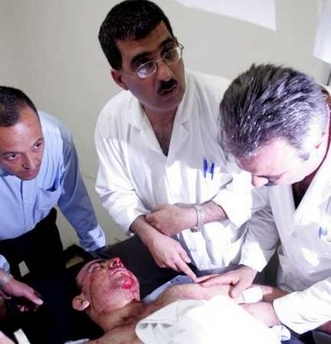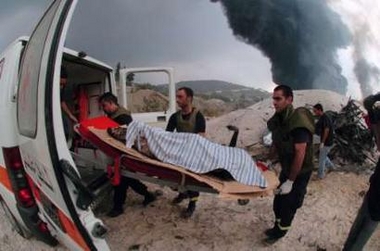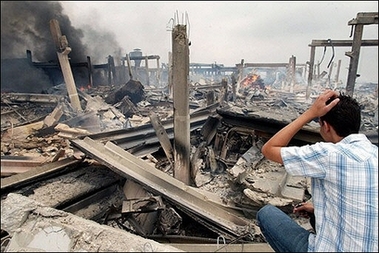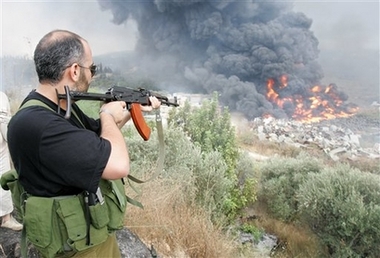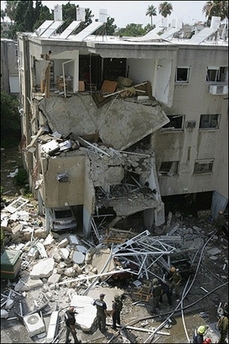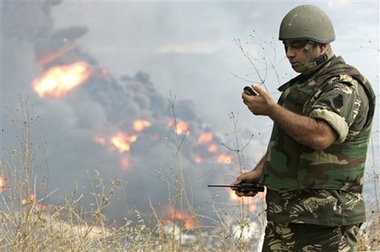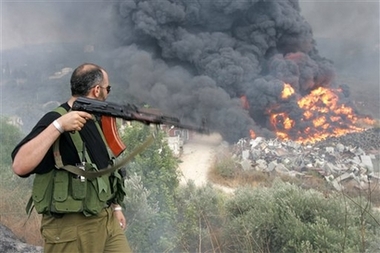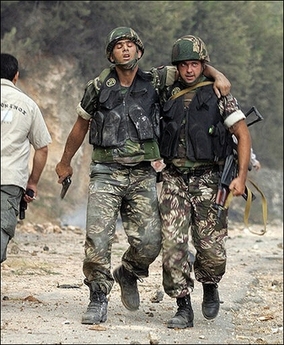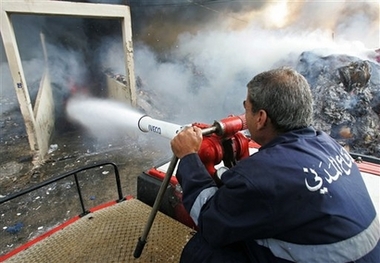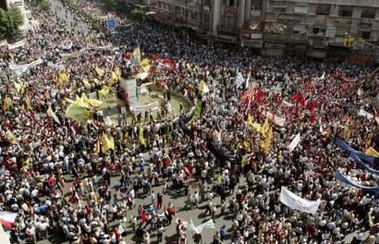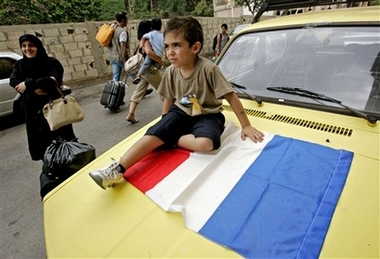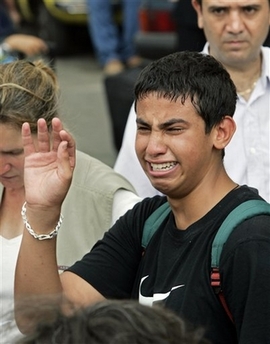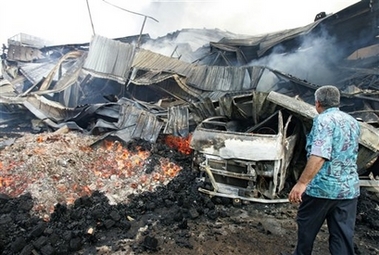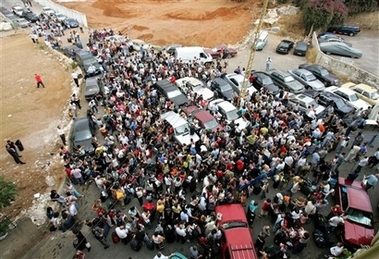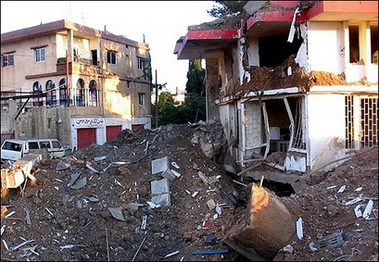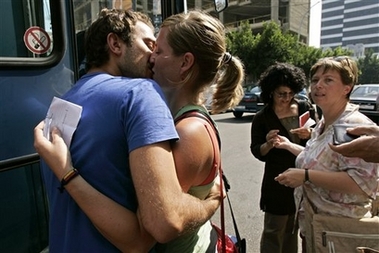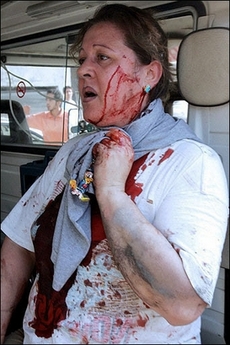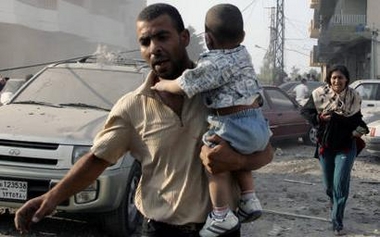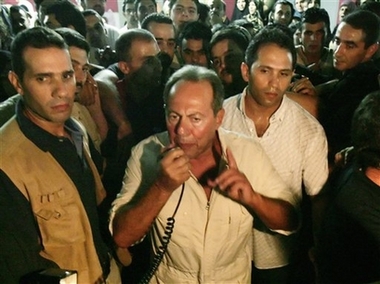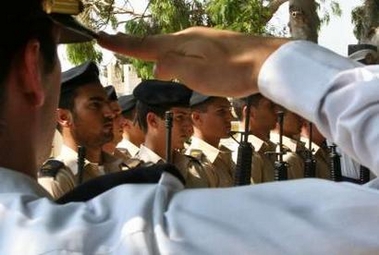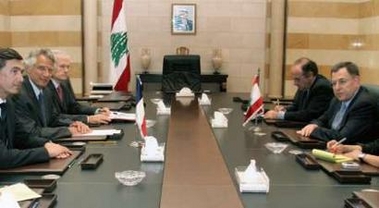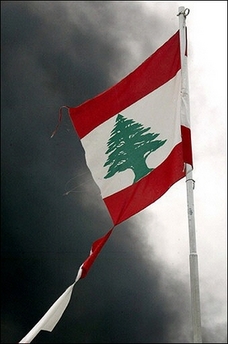 DAY 6, By Joel Greenberg, Tribune foreign correspondent, Israeli warplanes continued their onslaught on the Hezbollah stronghold in southern Beirut, reducing apartment buildings to rubble and knocking out power in wide areas. The army said it warned residents of seven villages near the border with Israel to vacate their homes before a heavy assault. Hezbollah militants fired volleys of rockets at Israel’s third-largest city Sunday, killing eight people and wounding more than 20 in the worst single attack in Israel in five days of widening conflict with the Lebanese guerrilla group. Waves of Israeli air strikes across Lebanon killed at least 28 people.
DAY 6, By Joel Greenberg, Tribune foreign correspondent, Israeli warplanes continued their onslaught on the Hezbollah stronghold in southern Beirut, reducing apartment buildings to rubble and knocking out power in wide areas. The army said it warned residents of seven villages near the border with Israel to vacate their homes before a heavy assault. Hezbollah militants fired volleys of rockets at Israel’s third-largest city Sunday, killing eight people and wounding more than 20 in the worst single attack in Israel in five days of widening conflict with the Lebanese guerrilla group. Waves of Israeli air strikes across Lebanon killed at least 28 people.
The death toll since Wednesday was believed to exceed 200. Most of those killed have been civilians, and most have been Lebanese.The rocket attacks on Haifa emptied the streets of the port city of 270,000. Residents hunkered down in their homes and took cover in bombproof rooms and shelters as sirens warned of missile strikes. Pedestrians ran for cover as the sirens wailed, and motorists stopped their cars beneath overpasses. Pls click READ MORE to view more pictures, and click on news archive to view pictures of day1 and day2.
To view the end of the article pls scroll down:
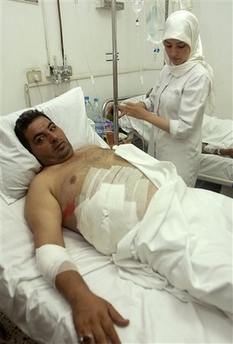
President Lebanon Emile Lahoud visits Lebanese evacues in a shelter in the suburbs of Beirut, Lebanon, Monday, July 17, 2006. Diplomatic efforts to end Israeli-Hezbollah fighting gained traction Monday, with Israeli officials saying the country would agree to halt fighting if its two captured soldiers were returned and Islamic guerrillas withdrew from the border. Overnight attacks by Israeli warplanes and big guns killed 17 people and wounded at least 53, Lebanese security officials said. The death toll since fighting began on Wednesday after Hezbollah captured two Israeli soldiers has climbed above 200 _ 196 in Lebanon, 24 in Israel. (AP Photo/ Issam Kobeisi)
Lebanese men save an intact roll in a carton factory that was set ablaze after it was targeted by an Israeli airplane missile, in the village of Kfar Jarra, near the port city of Sidon, southern Lebanon, Monday, July 17, 2006. Diplomatic efforts to end Israeli-Hezbollah fighting gained traction Monday, with Israeli officials saying the country would agree to halt fighting if its two captured soldiers were returned and Islamic guerrillas withdrew from the border. (AP Photo/Mohammed Zaatari)
Lebanese Prime Minister Fouad Siniora shakes hands with French Prime Minister Dominique De Villepin (R) upon his arrival to the grand Saray in Beirut July 17, 2006. REUTERS/Stringer (LEBANON)
Lebanese Red Cross members remove two Lebanese civilians killed in an Israeli air raid at the port in Beirut. Lebanon shook under a new wave of air raids after Israel vowed a fierce response to Hezbollah guerrilla attacks with no sign of a let-up in a conflict that has killed about 200 people in six days.(AFP/Ramzi Haidar)
A Lebanese Hizbollah guerrilla looks at a fire in a Beirut suburb, July 17,2006. (Issam Kobeisi/Reuters)
Dozens of Palestinians and Lebanese who hold Danish nationality wait their turn in front of the Danish embassy in Damascus on Monday July 17, 2006 to be evacuated to Denmark. Thousands of Arab and foreign tourists have fled Lebanon into Syria during the past few days after Israel started its attacks on the Lebanese infrastructure and its seaports and airports.(AP Photo/ Bassem Tellawi).
A Lebanese Hizbollah guerrilla aims his rifle as smoke rises from a Beirut suburb, July 17, 2006. (Adnan Hajj/Reuters)
A Lebanese soldier at the site of an Israeli air attack on Beirut’s southeastern Kafarchima neighborhood. US military helicopters flew 43 people out of conflict-stricken Lebanon amid preparations for a larger scale evacuations including a chartered ship and US warships.(AFP/Ramzi Haidar)
Lebanese civil defence personnel carry a body killed by a burning object in Beirut suburb’s July 17, 2006. Israel bombarded Lebanon for a sixth day on Monday and dismissed as premature a U.N. Proposal for an international peacekeeping force to help end the worst fighting across the Israeli-Lebanese border in more than 20 years. This picture is shot with a special lens. REUTERS/Adnan Hajj (LEBANON)
A Lebanese youth checks a destroyed factory near the eastern Lebanese village of Jezzine, east of Sidon. Twelve Lebanese civilians were killed when an Israeli missile hit their minibus, police said, bringing the civilian toll from six days of Israeli bombardment to at least 182 dead.(AFP/Anwar Amro)
Smoke billows from a blaze started by an explosion in Kfarshima, near Beirut, Lebanon Monday, July 17, 2006. Lebanese TV stations broadcast video pictures Monday claiming to be an Israeli military aircraft falling to the ground in the area, but the Israeli military said no aircraft was shot down over Beirut, and there was no immediate confirmation of the cause of the explosion. (AP Photo/Ben Curtis)
A Hezbollah gunman aims his AK 47 at a fire caused by an explosion in Kfarshima, near Beirut, Lebanon, Monday, July 17, 2006. Lebanese TV stations broadcast video pictures Monday claiming to be an Israeli military aircraft falling to the ground in the area, but Israeli military said no aircraft was shot down over Beirut and there was no immediate confirmation of the cause of the explosion. (AP Photo/Hussein Malla)
A man stands on one of the trucks loaded with humanitarian aid before they depart for Lebanon from Amman, Jordan July 17, 2006. The signs on the trucks read, ‘Under the directives of King Abdullah, food and humanitarian aid for our Lebanese brothers’
. REUTERS/Majed Jaber (JORDAN)
Lebanese civilians run to cover in Dora during attacks by Israeli missiles at Beirut port, July 17, 2006. (Sharif Karim/Reuters)

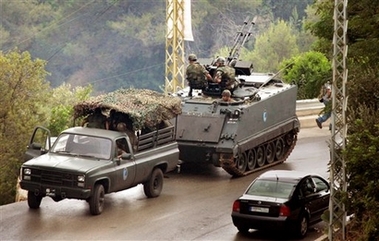
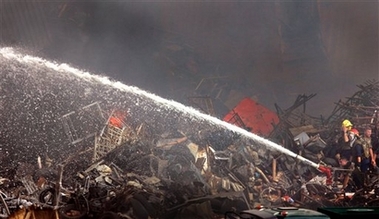
Lebanese firefighters try to get control of a blaze started by an explosion in Kfarshima, near Beirut, Lebanon Monday, July 17, 2006. Lebanese TV stations broadcast video pictures Monday claiming to be an Israeli military aircraft falling to the ground in the area, but the Israeli military said no aircraft was shot down over Beirut, and there was no immediate confirmation of the cause of the explosion. (AP Photo/Ben Curtis)
A Lebanese soldier uses his mobile phone in front of a fire caused by an explosion in Kfarshima, near Beirut, Lebanon, Monday, July 17, 2006. Lebanese TV stations broadcast video pictures Monday claiming to be an Israeli military aircraft falling to the ground in the area, but Israeli military said no aircraft was shot down over Beirut and there was no immediate confirmation of the cause of the explosion. (AP Photo/Hussein Malla)
A Hezbollah gunman watches a fire causes by an explosion in Kfarshima, near Beirut, Lebanon, Monday, July 17, 2006. Lebanese TV stations broadcast video pictures Monday claiming to be an Israeli military aircraft falling to the ground in the area, but Israeli military said no aircraft was shot down over Beirut and there was no immediate confirmation of the cause of the explosion. (AP Photo/Hussein Malla)
Lebanese Hizbollah guerrillas ride a motorcycle as smoke rises from a burning object in a Beirut suburb July 17, 2006. Israeli Defence Minister Amir Peretz said on Monday that no Israeli jet or helicopter had been shot down over Lebanon but did not rule out that a drone many have been downed. REUTERS/Adnan Hajj (LEBANON)
Lebanese soldiers stand guard along a street as smoke rises from a burning object in a Beirut suburb July 17, 2006. Israeli Defence Minister Amir Peretz said on Monday that no Israeli jet or helicopter had been shot down over Lebanon but did not rule out that a drone many have been
Black smoke rises behind a Lebanese flag. European Union foreign ministers have warned that spiralling violence between Israel and Hezbollah threatens security in the entire Middle East, as the bloc’s top diplomat returned from Lebanon.(AFP/Mahmoud Zayat)
A Lebanese soldier helps a wounded comrade following an Israeli air raid. European Union foreign ministers have warned that spiralling violence between Israel and Hezbollah threatens security in the entire Middle East, as the bloc’s top diplomat returned from Lebanon.(AFP/Ramzi Haidar)
A Lebanese firefighter extinguishes a storage depot that was set ablaze after it was targeted by an Israeli airstrike in the town of Choueifat, at the southern edge of Beirut, Lebanon, Monday, July 17, 2006. Israeli aircraft targeted Hezbollah’s strongholds in southern Beirut Monday, firing missiles whose detonations shook the capital city. Hours earlier, Israeli planes had attacked the capital’s infrastructure, killing two people in the port and setting ablaze a gas storage tank, witnesses and Lebanese media said. (AP Photo/Hussein Malla)
Syrian demonstrators carrying Lebanese flags and photos of Hizbollah leader Hassan Nasrallah and Syrian President Bashar al-Assad participate in a protest against Israeli raids on Lebanon in Damascus July 17, 2006. REUTERS/Khaled al-Hariri (SYRIA)
A young French woman cries as she waits to be evacuated from Lebanon, with others, near the French embassy in Beirut, Lebanon, Monday, July 17, 2006. Hundreds of French citizens, mostly of Lebanese origin or partners in mixed marriages, gathered in a Christian Beirut neighborhood Monday near their embassy to be evacuated amid growing signs that the conflict in Lebanon may drag on. Preparations are underway for the evacuation of thousands of other foreigners in Lebanon. Some already left, mostly to neighboring Syria or by sea to the Mediterranean island of Cyprus. (AP Photo/ Hussein Malla)
French ex patriot Mahdi Ayoub, 5, sits on the French flag as he waits with her mother Mariam to be evacuated from Lebanon near the French embassy in Beirut, Lebanon, Monday, July 17, 2006. Hundreds of French citizens, mostly of Lebanese origin or partners in mixed marriages, gathered in a Christian Beirut neighborhood Monday near their embassy to be evacuated amid growing signs that the conflict in Lebanon may drag on. Preparations are underway for the evacuation of thousands of other foreigners in Lebanon. Some already left, mostly to neighboring
A French ex patriot waves goodbye to his relatives as he waits near the French embassy in Beirut, Lebanon, Monday, July 17, 2006, to be evacuated from the country. Hundreds of French citizens, mostly of Lebanese origin or partners in mixed marriages, gathered in a Christian Beirut neighborhood Monday near their embassy to be evacuated amid growing signs that the conflict in Lebanon may drag on. Preparations are underway for the evacuation of thousands of other foreigners in Lebanon. Some already left, mostly to neighboring Syria or by sea to the Mediterranean island of Cyprus.(AP Photo/Kevork Djansezian)
A Lebanese man walks past the wreckage of a storage depot that was targeted by an Israeli airstrike in the town of Choueifat, at the southern edge of Beirut, Lebanon, Monday, July 17, 2006. Israeli aircraft targeted Hezbollah’s strongholds in southern Beirut Monday, firing missiles whose detonations shook the capital city. Hours earlier, Israeli planes had attacked the capital’s infrastructure, killing two people in the port and setting ablaze a gas storage tank, witnesses and Lebanese media said. (AP Photo/Hussein Malla)
French expatriates wait to be evacuated from Lebanon near the French embassy in Beirut, Lebanon, Monday, July 17, 2006. Hundreds of French citizens, mostly of Lebanese origin or partners in mixed marriages, gathered in a Christian Beirut neighborhood Monday near their embassy to be evacuated amid growing signs that the conflict in Lebanon may drag on. Preparations are underway for the evacuation of thousands of other foreigners in Lebanon. Some already left, mostly to neighboring Syria or by sea to the Mediterranean island of Cyprus. (AP Photo/ Hussein Malla)
United Nations staff and their families board coaches in Beirut, Lebanon Monday, July 17, 2006 to be evacuated from the Lebanese capital. Preparations are underway for the evacuation of thousands of other foreigners in Lebanon, with some already having left. (AP Photo/Mahmoud Tawil)
A house lies in ruins after being targeted by Israeli warplanes. International efforts are under way to try to transfer two Israeli soldiers being held by Hezbollah guerrillas to Lebanese authorities in a bid to end an increasingly deadly conflict.(AFP/Ahmad Shalha)
Israeli soldiers sleep inside an armored vehicle at an artillery position near Kiryat Shmona, in northern Israel near the Lebanese border, Monday, July 17, 2006. Hezbollah and Israel traded fierce barrages for a sixth day Monday, as the latest eruption of warfare in the Middle East showed no sign of easing.(AP Photo/Muhammed Muheisen)
Tina Schmidt, from Germany, kisses her Lebanese Armenian boyfriend Garen Keushkarian, before boarding one of the coaches organised by the German Embassy to evacuate German expatriates affected by the growing conflict, in the downtown Hamra area, in Beirut, Lebanon, Monday, July 17, 2006. Some 450 expatriates from Germany who had been living in Lebanon boarded buses headed for Damascus, Syria, according to passengers. (AP Photo/Kevork Djansezian
A wounded Lebanese woman, covered in blood, is evacuated after surviving an Israeli air strike in Tyre, south Lebanon. Hezbollah leader Hassan Nasrallah vowed to wage an unrestrained campaign against Israel as over 50 Lebanese were killed in a devastating blitz of Israeli strikes and the Jewish state was hit by an unprecedented rocket attack.(AFP/Hassan Ammar)
Icelanders Gudmundur (from L-R), Mar and Markus stand in the streets, with the Lebanese flag seen above them, in front of the Le Meridien Hotel in Hamra, Beirut July 17, 2006. The three flight crew members will evacuate Lebanon Monday morning. REUTERS/Ayman Saidi (LEBANON)
Lebanese civilians evacuate after an Israeli aircraft destroyed a house in Tyre, Lebanon, July 16, 2006. REUTERS/Elie Abou Faysal
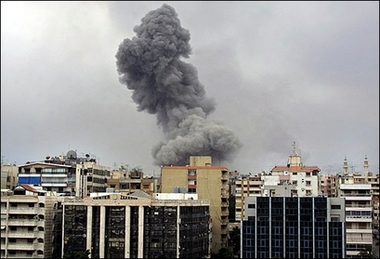
Israeli soldiers stand in formation during the funeral of Shai Atias, an Israeli sailor who was killed after a naval vessel was attacked by Hizbollah off the coast of Lebanon on July 14, at the military cemetery in Holon near Tel Aviv July 17, 2006. Israel bombarded Lebanon for a sixth day on Monday and dismissed as premature a proposal for an international stability force to help end the worst fighting across the Israeli-Lebanese border in more than 20 years. REUTERS/Gil Cohen Magen (ISRAEL)
Lebanese Prime Minister Fouad Siniora (R) meets with French Prime Minister Dominique De Villepin (2nd L) at the grand Saray in Beirut July 17, 2006. REUTERS/Stringer (LEBANON)
The army said about 20 rockets hit in and around Haifa, which is located near a complex of fuel refineries and petrochemical plants. According to the military, most of the rockets were Syrian-made Fajr 3s developed in Iran, with a 27-mile range and a 100-pound payload, far more advanced than the Katyushas fired earlier at northern Israeli communities.
One rocket scored a direct hit on a train repair depot, killing eight workers, medics reported. The rocket, packed with steel ball bearings to inflict more casualties, blasted through the roof of the repair hangar, spraying shrapnel across a wide area.
"We heard booms. We started running to the shelter, and on the way the rocket came in from the roof," said Yossi Amergi, 46, a mechanic who was wounded in the attack. "Everything shook, my ears exploded, and I saw blood pouring from my leg. I saw people on the ground, people screaming in panic. The wounded were full of holes."
Recovery workers removed the dead, lining them up in white body bags on the blood-stained floor that was pitted with shrapnel and strewn with debris scattered by the blast.
The lethal rocket strike unsettled this mixed city of Jews and Arabs, suddenly turning it into a frontline community in the widening conflict across Israel’s northern border.
Another Hezbollah rocket strike later Sunday reached the towns of Afula and Upper Nazareth, about 30 miles from Lebanon, the deepest attack yet in five days of fighting. Preparing for even longer-range strikes, Israel’s home front command warned Israelis living in Tel Aviv and areas to the north to "be alert."
Hezbollah chief issues threat
Hezbollah leader Sheik Hassan Nasrallah, appearing on the group’s Al-Manar television station for the first time since the start of the Israeli assault, warned of more devastating attacks.
"As long as the enemy carries out its aggression without limits and without red lines, we will confront it without limits and without red lines," Nasrallah said. "What was fired until now is only a very small part of our arsenal, and our capability to shoot much more still exists."
Nasrallah warned that the next strike on Haifa "will not spare anything in Haifa and its surroundings," a reference to the fuel and petrochemical installations near the city.
Maj. Gen. Elizer Shkedi, the commander of the Israeli air force, told a news conference that despite Israeli attacks on Hezbollah rocket stores, "they still have a great many rockets of all kinds."
In Beirut, Israeli warplanes dropped bunker-busting bombs on Nasrallah’s stronghold in the heaviest strikes yet in the southern neighborhoods of the city.
Fires raged and heaps of rubble and twisted metal covered entire city blocks near the Hezbollah compound in the southern district, known as Dahiyah, The Associated Press reported. One building was collapsed on its side; other apartment buildings were reduced to rubble or had their upper floors collapsed into those below. Broken furniture, blankets, mattresses, clothes and stuffed toys were scattered on the streets.
The area was empty except for guerrillas and a few residents who returned to collect belongings before taking refuge elsewhere.
Hezbollah’s Al-Manar television was knocked off the air after its studios were destroyed, but it quickly resumed broadcasting, using backup facilities.
The Jiyeh power plant on Beirut’s southern outskirts was in flames after being hit, cutting electricity to many areas in the capital and south Lebanon, the AP reported.
In southern Lebanon, Israeli missiles tore off three floors of a 12-story civil defense building in Tyre, killing at least nine people and wounding more than 40, Lebanese security officials said. The Israeli army said it has attacked a building used by Hezbollah.
Seven Canadians of Lebanese origin, all members of the same family, were killed by an Israeli strike on their house in Aitaroun, where they had come for a summer visit, Lebanese and Canadian officials said. The Israeli army said that it had no information on civilian casualties and that it warned civilians to stay away from areas used by Hezbollah to launch rockets at Israel.
Maj. Gen. Udi Adam, the chief of the Israeli army’s northern command, said warnings were issued to Lebanese villagers near the border with Israel to leave their homes because of an impending Israeli strike on rocket-launching sites. The army said the messages were broadcast to seven villages, and areas near the villages were being shelled after many residents left.
An Israeli raid on Abdeh, a port in northern Lebanon near the Syrian border, killed eight Lebanese soldiers, local security officials said. The Israeli army said it targeted a coastal military radar installation, one of several hit because of radar guidance given to a missile fired by Hezbollah that hit an Israeli gunship off the Lebanese coast on Friday.
In the early hours Monday, witnesses reported that waves of Israeli air strikes hit the Lebanese city of Tripoli and Hezbollah strongholds in eastern town of Baalbek, AP reported.
Israeli terms for truce
Lebanese Information Minister Ghazi al-Aridi said Italian Prime Minister Romano Prodi had conveyed Israeli Prime Minister Ehud Olmert’s terms for a cease-fire: the release of two soldiers abducted by Hezbollah last week and a withdrawal of Hezbollah from positions on the Israeli border to a line behind the Litani River, about 12 miles north of the border with Israel.
Along with the Lebanon attacks, Israel attacked on the second front where it is fighting, in Gaza. Fighter jets bombed the Palestinian Foreign Ministry in Gaza City. Clouds of smoke rose from the building, which has been hit before. At least nine people in nearby houses were injured, rescue workers said.
Israeli troops, tanks and helicopter gunships re-entered northern Gaza on Sunday and battled armed Palestinians. The raid killed five Palestinians, including three militants.
On the streets in Haifa
In the Central Carmel neighborhood of Haifa after the Hezbollah rocket strikes, trendy cafes and restaurants were closed, shops were shuttered and there were few people on the streets.
Sitting in a lone cafe that was still open, Rami Katz, 51, a carpenter taking a break from work at an adjacent hotel, seemed unfazed.
"Wherever the rocket falls, it falls," he said. "There’s nothing you can do about it." Katz said Palestinian suicide attacks in the city in recent years had made him more anxious.
Serving customers behind the counter, Osnat Varshavsky, 35, also seemed unperturbed.
"It doesn’t make a difference whether I’m at home or at work," she said. "I don’t have a shelter at home, and I live on the third floor, so it’s equally dangerous. If it’s going to happen, it will happen. There is nothing safe in Israel."
Aaron Offir, 60, who works in marketing, said he supports the campaign against Hezbollah.
"This the right response," he said. "There is no other way to get rid of these kinds of terrorists."
Offir, who left the house to get medication for his mother, said he wasn’t particularly concerned by the rocket attacks.
"Each missile has an address, and you hope you are not the address," he said.
Lebanese PM accuses Israel of terrorism
Monday July 17, 2006, PARIS – Lebanese Prime Minister Fouad Siniora accused Israel of using terrorist methods to exert pressure on Lebanon and said its offensive would foster extremism in the Middle East. "Israel accuses others of terrorism at the same time as it carries it out in the harshest forms," he said in an interview with the Le Monde daily published today. "It creates problems and maintains them as open wounds to be used as a means of exerting pressure," he said.
The comments came as Israel continued its air strikes against Lebanon and UN Secretary-General Kofi Annan said Security Council members would start hammering out a detailed agreement on deploying a multilateral security force to Lebanon.
Israel says the strikes it has carried out across southern Lebanon and parts of Beirut in the past six days are designed to destroy guerrilla group Hizbollah’s ability to fire rockets into Israel and has said it regrets any civilian casualties. It also says that the fighting was provoked by Hizbollah, a member of the Lebanese government, after some of its fighters captured two Israeli soldiers in a cross-border raid.
Siniora said Israel’s detention of Lebanese prisoners, as well as air raids and minefields planted on Lebanese territory were all part of a strategy aimed at destabilising Lebanon. "How can one explain behaviour like this if not out of a desire to maintain a state of tension and keep pressure on Lebanon," he said. "The lack of a definitive solution to these endemic problems favours extremism."
He repeated that the Lebanese government was not informed of the capture of two Israeli soldiers by Hizbollah guerrillas and was not responsible for the incident which triggered the Israeli attack, but said his government was in contact with the group.
"There will be contacts. The contacts have never been interrupted and we will continue to work ceaselessly, on the basis of a clear position and keeping the interests of Lebanon and the Arabs in mind," he said. Siniora expressed gratitude for French support but was more sceptical about US expressions of support.
"They are our friends but their friendship for others is greater," he said, a clear reference to Israel.

